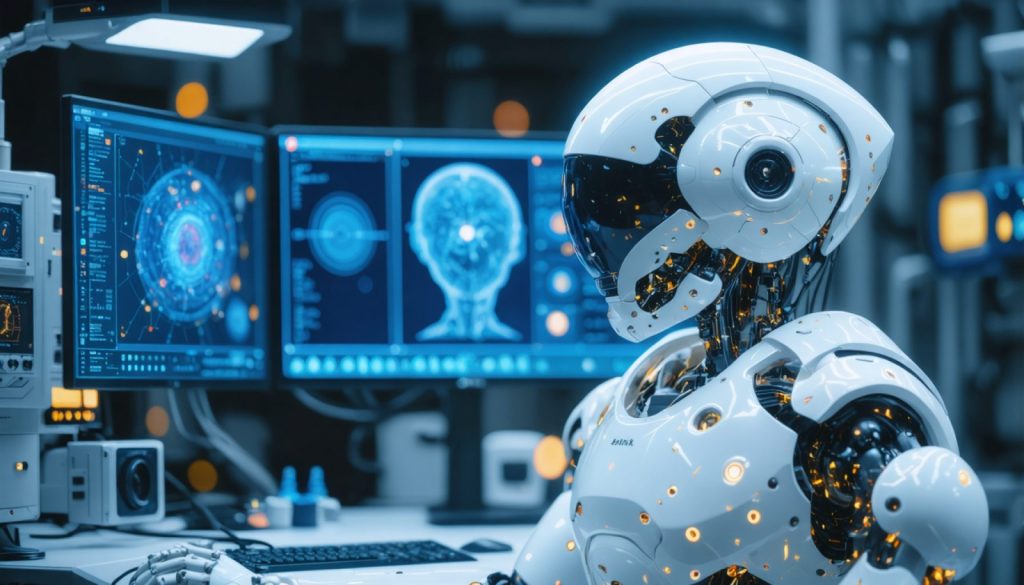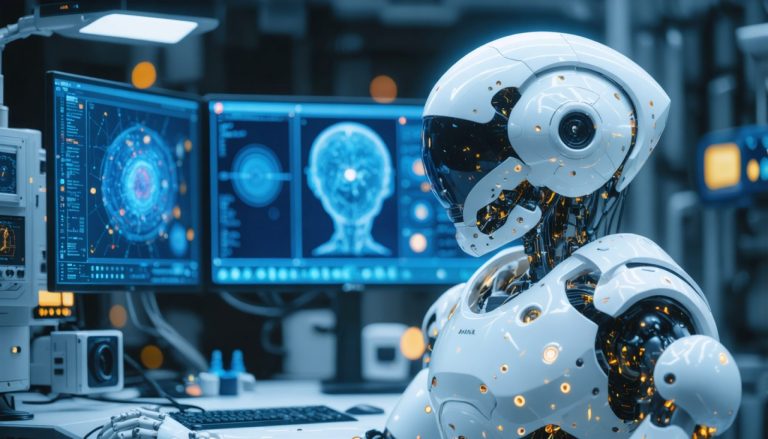
- AI could revolutionize healthcare by drastically reducing the time and cost of drug development, shifting the process from years to weeks or months.
- Demis Hassabis, CEO of Google DeepMind, envisions AI as a transformative force capable of eradicating diseases, inspired by successes like AlphaFold’s protein mapping.
- The precision of AI in identifying molecular flaws offers potential for creating targeted therapies with pinpoint accuracy.
- While the vision of a disease-free world is compelling, ethical considerations and safety measures are vital due to AI’s potential for misuse.
- The future of AI in medicine requires balancing innovation with responsible oversight, aiming for unprecedented healthcare breakthroughs.
In an age where technology constantly redefines the boundaries of possibility, imagine a world where diseases cease to exist. This is the daring vision put forth by Demis Hassabis, the CEO of Google DeepMind, as he forecasts a future reshaped by advanced artificial intelligence. During a compelling discussion on 60 Minutes, Hassabis unveiled his belief that AI could dismantle the staggering barriers of time and cost that have historically shackled drug development.
Currently, the journey from a promising compound to a shelf-ready medication can span up to a decade and incur costs that stagger into the billions. However, in Hassabis’s narrative, AI emerges as the ultimate disruptor—a powerful agent capable of condensing this arduous process into mere weeks or months. Such an advancement promises not just efficiency but a seismic shift in the paradigm of healthcare.
Drawing from AlphaFold’s triumph in mapping over 200 million protein structures in a breathtakingly short period—accomplishments that would have demanded eons of human effort—Hassabis illustrated the profound potential AI holds in decoding the intricate language of life. By precisely identifying the flaws in protein structures that herald diseases, AI could orchestrate a new era of targeted therapies, designed with pinpoint precision to address malfunctions at their molecular roots.
Hassabis’s audacious assertion—potentially eradicating all diseases within the next decade—enraptures and inspires. This vision is met with applause from influential figures like Aravind Srinivas, CEO of Perplexity AI, who lauded Hassabis’s genius and called for unbridled support of this visionary crusade.
Yet, amid the enthusiasm, Hassabis remains vigilant, acknowledging the double-edged nature of AI’s rapid ascent. The potential for misuse or unintended consequences underscores a pressing need for ethical alignment and robust safety measures. As we stand on the precipice of this revolutionary frontier, the conversation hinges on maintaining a delicate balance between fervent innovation and cautious stewardship.
The key takeaway? While AI heralds unprecedented possibilities, its potential hinges on carefully navigating both its promise and peril. The challenge is formidable, yet the prospect of reimagining a world free from disease demands our boldest aspirations and our most measured caution. If realized, Hassabis’s vision could anchor one of humanity’s crowning achievements. The horizon beckons—are we ready to rise to the challenge?
Can AI Truly Eradicate All Diseases? Exploring the Future of Healthcare
Introduction
Imagine a world where diseases are a relic of the past—this vision, proposed by Demis Hassabis, CEO of Google DeepMind, underscores the transformative potential of artificial intelligence (AI) in reshaping healthcare. His bold assertion suggests AI could revolutionize drug development, compressing an arduous decade-long process into mere months, drastically cutting costs, and spearheading a new era of precision medicine. While intriguing, this futuristic vision requires careful examination of both its promises and pitfalls.
Current Challenges in Drug Development
In today’s pharmaceutical industry, the path from discovery to market is fraught with challenges:
1. Time-Consuming Processes: Developing a new drug can take 10-15 years, involving extensive clinical trials and regulatory hurdles.
2. Exorbitant Costs: The billion-dollar price tag associated with drug development makes it prohibitively expensive for many innovative treatments to reach patients.
AI’s Role in Accelerating Drug Discovery
AI, especially through initiatives like AlphaFold, has exhibited remarkable potential in biotechnology:
– Protein Structure Mapping: AlphaFold has successfully mapped over 200 million protein structures, significantly expediting research efforts that would have spanned centuries manually.
– Precision Medicine: AI can identify molecular abnormalities, paving the way for targeted therapies aimed at the root causes of diseases.
Despite these advancements, skepticism remains. The following points highlight some areas where AI could face hurdles:
Limitations and Ethical Considerations
1. Data Privacy Concerns: The vast amounts of patient data required for AI models raise substantial privacy issues.
2. Regulatory Hurdles: While AI can accelerate initial stages of drug discovery, clinical trials and approval processes remain time-intensive and regulatory-dependent.
3. Risk of Misuse: AI systems need safeguards to prevent misuse in creating harmful biological agents or decision-making errors in medical treatments.
Real-World Use Cases
AI is already beginning to impact healthcare significantly:
– Genetic Research: AI tools are accelerating genomic analysis, leading to swift identification of genetic disorders.
– Personalized Treatment Plans: By analyzing patient data, AI can customize therapeutic strategies tailored to individual needs, potentially increasing treatment efficacy.
Market Forecast and Industry Trends
The AI healthcare market is anticipated to grow substantially, with projections suggesting it could exceed $300 billion by 2030, driven by technological advancements and growing acceptance across healthcare systems.
Actionable Recommendations
1. Embrace AI Solutions: Healthcare providers should consider integrating AI-driven tools to streamline operations and enhance patient care.
2. Prioritize Ethical AI Integration: Establishing clear ethical guidelines and regulatory frameworks is crucial to navigate AI’s integration into healthcare safely.
3. Invest in Education and Training: As AI becomes more prominent, equipping the workforce with necessary AI literacy and skills will be pivotal.
Conclusion
The idea of a world free from disease—championed by visionaries like Demis Hassabis—is both thrilling and daunting. Balancing AI’s transformative potential with ethical considerations, regulatory compliance, and societal impacts will be critical as we venture into this promising frontier.
For further insights into AI breakthroughs and innovations, visit Google and explore DeepMind. Engage, learn, and contribute to this ambitious journey toward a healthier future for all.
The future beckons—are we ready to embrace it?



